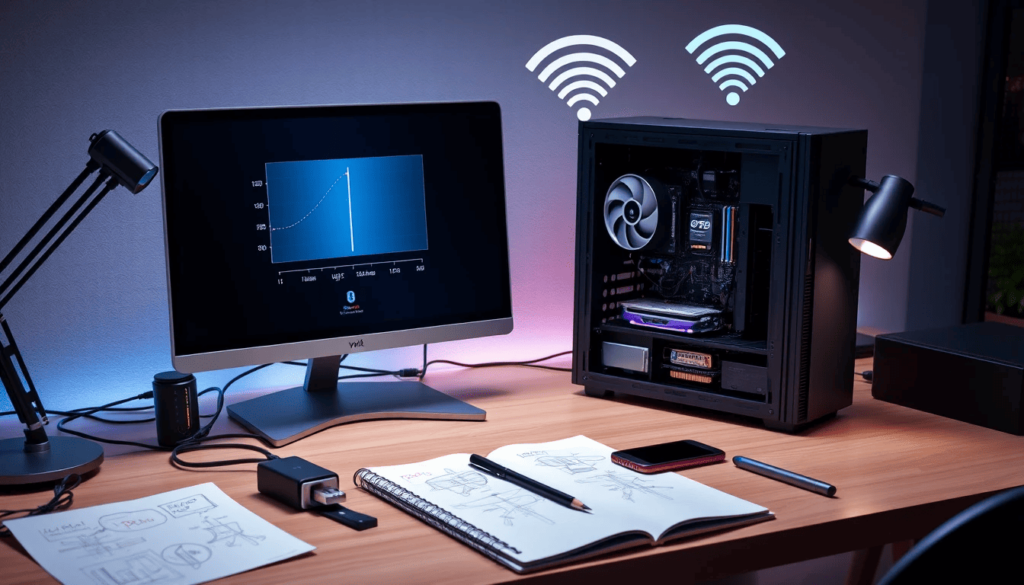Usb vs pcie wifi: which is better for your needs?

When it comes to improving your computer's Internet connectivity, WiFi adapters are a popular choice. However, a question arises: should you choose a USB or a PCIe adapter? In this article, we will explore the key differences between these two types of adapters to help you make an informed decision.
The choice between a USB and a PCIe adapter affects not only the speed of your connection but also the ease of installation and portability. Below, we will analyze each of these factors in detail.
- What Are The Key Differences Between USB And PCIe WiFi Adapters?
- How Do USB WiFi Adapters Compare For Gaming?
- Which Is Better For Your Needs: USB vs PCIe WiFi?
- What Are The Advantages Of Using A PCIe WiFi Card?
- Are USB WiFi Adapters Good For Gaming Performance?
- What Should You Look For In The Best USB WiFi Adapter?
- How Does A PCI vs PCIe WiFi Card Affect Performance?
What Are The Key Differences Between USB And PCIe WiFi Adapters?
The first difference to consider between USB and PCIe WiFi is how they connect to your computer. USB adapters are external devices that connect to a USB port, while PCIe adapters are internal cards that require opening your desktop computer's case for installation.
In terms of performance, PCIe adapters tend to be faster and more stable. This is because they generally have better antenna quality and can handle higher connection speeds. On the other hand, USB adapters are more portable and easier to install, making them an attractive option for those who do not need high performance.
Another important aspect is driver support. Often, PCIe adapters offer better compatibility with different operating systems, while USB adapters may require manual driver installations, which can be inconvenient for some users.
How Do USB WiFi Adapters Compare For Gaming?
If you are a gaming enthusiast, it is crucial to consider how adapters perform in terms of gaming performance. PCIe adapters are usually the preferred option for gaming due to their ability to provide faster and more stable connections. This is especially relevant in online games where latency and speed are critical factors.
Lower latency: PCIe adapters tend to have lower latency, resulting in a smoother gaming experience.
Better support for multiple devices: PCIe cards can handle multiple connections without compromising performance.
Greater signal capacity: With built-in antennas, PCIe adapters can offer better reception over long distances.
However, this does not mean that USB adapters are inadequate for gaming. There are several USB adapter options that offer solid performance and are convenient for those using laptops or seeking a quick and easy installation solution.
Which Is Better For Your Needs: USB vs PCIe WiFi?
The answer to which is better between USB vs PCIe WiFi depends on your specific needs. If you value portability and ease of installation, a USB adapter may be the best choice. They are ideal for users who move frequently or do not want to deal with internal hardware installation.
On the other hand, if your primary focus is performance and stability, especially for gaming or video streaming, a PCIe adapter is undoubtedly the superior option. The ability to handle higher speeds and provide more stable connections is crucial for these demanding applications.
What Are The Advantages Of Using A PCIe WiFi Card?
PCIe cards offer several advantages that make them attractive to users looking to maximize their connectivity. Some of these advantages include:
Superior performance: PCIe cards often offer higher speeds than their USB counterparts.
Stable connections: Due to their internal location, they are less prone to external interference.
Ease of upgrade: PCIe adapters can be easily upgraded by replacing the card, whereas USB adapters require purchasing a new device.
In general, if you are looking for a long-term solution and do not mind performing an internal installation, PCIe cards are an excellent investment.
Are USB WiFi Adapters Good For Gaming Performance?
USB adapters can be good for gaming, but their performance depends on the specific model. Some of the best USB adapters are designed to offer adequate speeds and low latency. However, it is important to note that not all USB adapters are equal.
When looking for the best USB adapter for gaming, consider the following:
Transfer speed: Look for models that offer speeds of up to 1 Gbps or more.
High-quality antenna: An adapter with external antennas can improve signal and stability.
Compatibility: Ensure the adapter is compatible with your operating system and hardware.
In conclusion, while USB adapters can work well for gaming, users seeking maximum performance will likely benefit more from a PCIe adapter.
What Should You Look For In The Best USB WiFi Adapter?
When choosing the best USB adapter, there are several factors you should consider to ensure it meets your needs:
Frequency range: Look for adapters that operate on 2.4 GHz and 5 GHz bands for greater flexibility.
Connection speed: Ensure the adapter supports your router's speeds to avoid bottlenecks.
Compact design: A small and portable design is ideal if you plan to move the adapter between different devices.
Additionally, it is important to read reviews and check other users' experiences to avoid disappointments.
How Does A PCI vs PCIe WiFi Card Affect Performance?
The main difference in terms of performance between PCI and PCIe lies in data transfer speed. PCI cards are older and generally cannot match the speeds achievable by PCIe cards.
PCIe cards offer more data lanes, meaning they can handle more information simultaneously. This is particularly important in applications that require high bandwidth, such as online gaming and high-definition video streaming.
In summary, if you want the best connectivity experience, opting for a PCIe adapter is the smartest decision.

Deja una respuesta